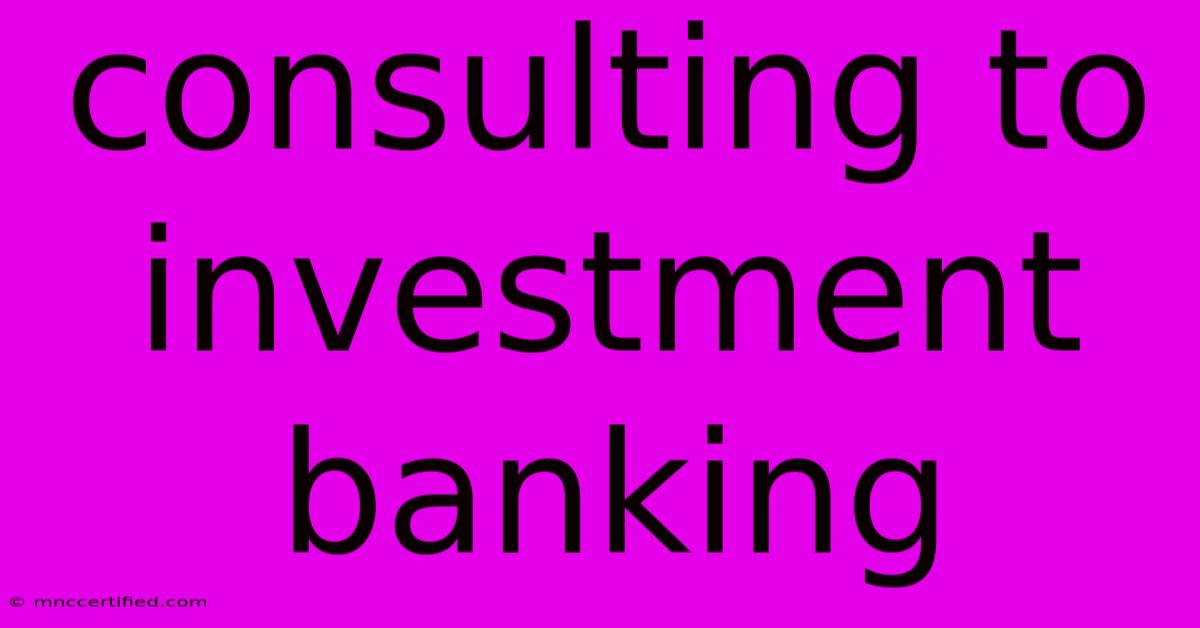Consulting To Investment Banking

Table of Contents
Consulting to Investment Banking: A Comprehensive Guide
The transition from consulting to investment banking is a coveted career path for many ambitious professionals. It offers a compelling blend of high intellectual stimulation, significant financial rewards, and the opportunity to work on complex, high-stakes deals. However, this transition isn't a guaranteed path; it requires strategic planning, targeted skill development, and a proactive approach to networking. This guide provides a comprehensive overview of how to successfully navigate this challenging yet rewarding career change.
Understanding the Appeal of the Switch
Why do so many consultants aspire to join the ranks of investment banking? Several key factors contribute to this allure:
- Higher Earning Potential: Investment banking is renowned for its exceptionally high salaries and bonuses, often exceeding those in consulting, especially at senior levels.
- Deal-Focused Work: Consultants often work on projects with defined scopes and timelines. Investment banking offers a more dynamic environment, focusing on executing transactions and directly impacting market outcomes.
- Specialized Expertise: Investment banking offers the chance to develop deep expertise in specific sectors or financial instruments, leading to greater career specialization.
- Prestige and Network: A career in investment banking carries considerable prestige, opening doors to a vast and influential professional network.
Bridging the Gap: Key Skills and Experience
While consulting provides a strong foundation, certain skills are crucial for a successful transition to investment banking. These include:
- Financial Modeling: Proficiency in financial modeling is paramount. Investment bankers rely heavily on building sophisticated models to analyze deals, valuing companies, and forecasting financial performance. Mastering Excel and specialized financial modeling software is essential.
- Valuation Techniques: A deep understanding of various valuation methodologies, such as discounted cash flow (DCF) analysis, comparable company analysis, and precedent transactions, is critical for performing accurate company valuations.
- Mergers & Acquisitions (M&A) Knowledge: Familiarity with the M&A process, including due diligence, negotiation, and deal structuring, is highly valued. Consultants with experience in M&A advisory engagements have a significant advantage.
- Presentation and Communication Skills: Investment bankers frequently present complex information to clients and senior management. Excellent communication and presentation skills are vital for conveying ideas clearly and persuasively.
- Networking: Building a strong network within the investment banking industry is crucial. Attending industry events, leveraging professional contacts, and proactively reaching out to recruiters are all essential strategies.
Leveraging Consulting Experience
Your consulting experience can be a significant asset. Highlight projects that demonstrate your:
- Analytical abilities: Showcase your problem-solving skills and ability to analyze large datasets to draw meaningful conclusions.
- Industry knowledge: Emphasize any sector expertise you've gained, which can be particularly valuable when targeting specific investment banking groups.
- Teamwork and leadership: Demonstrate your ability to collaborate effectively within teams and manage projects successfully.
The Application Process: Tips for Success
The application process for investment banking roles is highly competitive. Key steps to increase your chances of success include:
- Target Specific Firms and Roles: Research different investment banks and identify those that align with your career goals and sector interests. Tailor your resume and cover letter to each application.
- Craft a Compelling Resume and Cover Letter: Highlight your relevant skills and experiences, quantifying your accomplishments whenever possible. Use action verbs and showcase your impact.
- Ace the Interviews: Prepare for behavioral, technical, and case study interviews. Practice your responses to common interview questions and develop strong case study preparation strategies.
- Network Strategically: Leverage your network to gain insights into the industry and connect with potential recruiters or hiring managers. Informational interviews can be invaluable.
Beyond the Transition: Thriving in Investment Banking
Once you've secured a role, remember that continuous learning and development are vital for long-term success. Stay abreast of market trends, expand your technical skills, and actively seek mentorship opportunities. The investment banking world is dynamic and demanding, but with dedication and perseverance, you can build a highly successful and rewarding career.
Conclusion: Strategic Planning is Key
The transition from consulting to investment banking requires careful planning and strategic execution. By focusing on developing the necessary skills, leveraging your existing experience, and proactively networking, you can significantly increase your chances of making this successful career shift. Remember, persistence, preparation, and a clear understanding of the industry are essential ingredients for achieving your goals.

Thank you for visiting our website wich cover about Consulting To Investment Banking. We hope the information provided has been useful to you. Feel free to contact us if you have any questions or need further assistance. See you next time and dont miss to bookmark.
Featured Posts
-
Icc Seeks Arrest Of Israeli Hamas Leaders
Nov 22, 2024
-
Lakers Magic Game 2024 Odds Score Prediction
Nov 22, 2024
-
Colorado Lands Recruit Julian Lewis
Nov 22, 2024
-
India Vs Australia Bumrahs 4 Wickets Live Score
Nov 22, 2024
-
Bob Ross Trading Cards Checklist
Nov 22, 2024